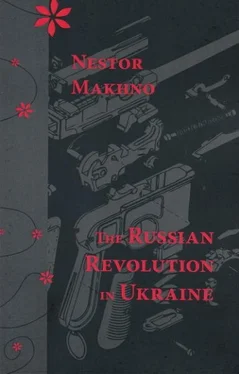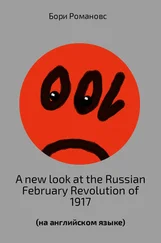Nestor Makhno - The Russian Revolution in Ukraine
Здесь есть возможность читать онлайн «Nestor Makhno - The Russian Revolution in Ukraine» весь текст электронной книги совершенно бесплатно (целиком полную версию без сокращений). В некоторых случаях можно слушать аудио, скачать через торрент в формате fb2 и присутствует краткое содержание. Город: Edmonton, Год выпуска: 2007, Издательство: Black Cat Press, Жанр: Биографии и Мемуары, на английском языке. Описание произведения, (предисловие) а так же отзывы посетителей доступны на портале библиотеки ЛибКат.
- Название:The Russian Revolution in Ukraine
- Автор:
- Издательство:Black Cat Press
- Жанр:
- Год:2007
- Город:Edmonton
- ISBN:нет данных
- Рейтинг книги:5 / 5. Голосов: 1
-
Избранное:Добавить в избранное
- Отзывы:
-
Ваша оценка:
- 100
- 1
- 2
- 3
- 4
- 5
The Russian Revolution in Ukraine: краткое содержание, описание и аннотация
Предлагаем к чтению аннотацию, описание, краткое содержание или предисловие (зависит от того, что написал сам автор книги «The Russian Revolution in Ukraine»). Если вы не нашли необходимую информацию о книге — напишите в комментариях, мы постараемся отыскать её.
The Russian Revolution in Ukraine
The Russian Revolution in Ukraine — читать онлайн бесплатно полную книгу (весь текст) целиком
Ниже представлен текст книги, разбитый по страницам. Система сохранения места последней прочитанной страницы, позволяет с удобством читать онлайн бесплатно книгу «The Russian Revolution in Ukraine», без необходимости каждый раз заново искать на чём Вы остановились. Поставьте закладку, и сможете в любой момент перейти на страницу, на которой закончили чтение.
Интервал:
Закладка:
I now proposed to the members of the Trade Union executive and factory committees a plan of expropriation of all the money capital to be found in the enterprises and the Gulyai-Pole Bank. I had no illusions about our ability to take over the enterprises, even with this cash at our disposal. The uyezd and gubernica Public Service Committees as well as the commissars of the central government would send troops. And these troops, hoping to win favour with the central authorities and avoid being sent to the front to face the Germans, would shoot the best militants of the workers, myself in particular. It was important to me to bring forward the idea of expropriation of capitalist enterprises at a time when the Provisional Government had still not succeeded in controlling the labouring masses and diverting them counter-revolutionary ways.
However, the majority of members of the trade union and factory committees earnestly requested that I refrain from presenting such a plan of action to the mass of the workers. They said we weren’t ready for such a step, justified though it might be, and premature action on our part might jeopardize any possibility of carrying out such a program in the future, when we would be better prepared.
After a frank discussion, the members of the Group came to the same conclusion. If my proposals were carried out now, the workers would have to depend on the peasantry to sustain them by expropriating the estates of the pomeshchiks. Practically this wouldn’t be possible until the fall harvest. Thus we would be taking a fatal step.
These conclusions shook me. I no longer insisted on immediate expropriation of the factories and workshops. But I urged that my proposal be accepted as the basis of the work of the factory committees — namely to prepare the workers to carry out expropriation in the near future. I assured the worker comrades that the peasants were also thinking along the same lines and said we must devote all our strength to coordinate the aspirations of both peasants and workers that they might be realized in practice simultaneously.
My position was adopted. At that time I was elected by all the workers as chairman of the Trade Union and Mutual Aid fund. Comrade Antonov was selected to be my deputy and replacement in the event of my being overloaded with work in other organizations.
The peasants also chose a comrade as a back-up who could replace me. But in both cases the rank-and-file insisted any initiatives come from me and that I coordinate the activities of both organizations.
The proprietors of the factories, mills and workshops came again to the Trade Union Soviet. Their position had not changed from the previous day. After two hours of bargaining they had a fit of generosity and agreed to increase wages by 45 to 60 percent. My response, as chairman of the meeting, was to declare our negotiations at an end. “The Trade Union Soviet has empowered me to take control over all public enterprises directed by you, citizens, but not rightfully belonging to you. We shall settle with you on the street in front of your respective businesses. Meeting adjourned!”
I collected my papers and headed for the telephone. At this moment, the owner of the largest factory in Gulyai-Pole, Boris Mikhailovich Kerner, got up from his seat and exclaimed: “Nestor Ivanovich, don’t be in such a hurry to end the meeting. Personally I consider the workers’ demand totally justified. They are right to expect us to comply with their proposal and I, for one, will sign my agreement to this…”
The other proprietors and especially their agents cried indignantly: “What are you doing, Boris Mikhailovich?”
“No, no, gentlemen, you do as you wish. I’m obligated to satisfy the demand of my workers,” replied Kerner.
I told them all to calm down, called for order, and asked: “Citizens, you’re all sticklers for law and order. Is it legal to re-open the meeting to discuss the same question which led to its adjournment?”
“Certainly, certainly!” was heard from all the proprietors and their agents.
“Then I declare the meeting open and propose that all of you sign the contract raising the workers’ wages by 80 to 100 percent.” And I handed out copies of the contract previously prepared. Feeling rather faint from fatigue and nervous tension, I handed over the meeting to comrade Mironov and retired to another room to take a short break.
Half an hour later I returned to the meeting hall. The proprietors began to sign the text of my proposed conditions. When they had all signed and left the Union hall, I sat at the telephone and called the worker-comrades in all the enterprises about the success of our negotiations, about the acceptance of our demands, and advised everyone to stay at their jobs until evening. And in the evening the members of the Union Soviet made detailed reports about our collective victory…
From that time on the workers of Gulyai-Pole and the surrounding region prepared themselves and organized all their workplaces. They studied the economic and administrative aspects of their enterprises and readied themselves for the seizure and direct management of these businesses.
Also from this time Gulyai-Pole attracted the special attention of the Ekaterinoslav Public Committee, along with the Ukrainian nationalist “ Selyan’ska spilka ”, [Peasants’ Union] the Provincial Soviet of Workers’, Peasants’, and Soldiers’ Deputies, and the Provincial Industrial Committee, not to mention various Aleksandrovsk organizations controlled by agents of the Provisional Government. The visits to Gulyai-Pole of instructors, organizers, and propagandists from these places became more frequent.
But these agents always left without results, stymied by the actions of the peasant- and the worker-anarchists.
Chapter 9
Some Results
Let’s move on to the “Public Committee” and look at how we, delegates from the Peasants’ Union, made use of the authority of this Committee in our region.
In the first place, having taken over the Land Department, we also tried to ensure that the Department of Provisioning was also an independent entity. When the time came that I had taken over the whole Committee, myself and some of my comrades on the Committee demanded the abolition of the Militia. When the central authorities would not allow this, we deprived the Militia of the right to make independent arrests and searches and thereby reduced its role to acting as a courier service for the Public Committee. Furthermore, I summoned all the landowners and kulaks and collected from them all the documents concerning their acquisition of privately-owned land. By means of these documents the Land Department produced a precise account of all the wealth in land at the disposal of the pomeshchiks and kulaks for their idle life-style.
We organized as part of the Soviet of Workers’ and Peasants’ Deputies a Committee of Batraks and created a batrak movement against the pomeshchiks and kulaks who were living on their labour.
We established practical control of the batraks over the pomeshchik and kulak estates and khutors, preparing the batraks to unite with the peasants and act together to expropriate all the wealth of individuals and declare it the social property of the toilers.
After all this, I personally was already losing interest in the Public Committee as an institution through which, within the framework of the existing order, one could do things legally which would keep the Revolution moving forward among the oppressed toilers in the countryside.
After consulting with a number of different comrades, I proposed to the whole group to establish an obligation for all our members: to propagandize among the peasants and workers urging them to change by any means possible their Public Committees, which tended to be less dependent on the will and rights of the peasants and workers than on the orders of some government commissar.
Читать дальшеИнтервал:
Закладка:
Похожие книги на «The Russian Revolution in Ukraine»
Представляем Вашему вниманию похожие книги на «The Russian Revolution in Ukraine» списком для выбора. Мы отобрали схожую по названию и смыслу литературу в надежде предоставить читателям больше вариантов отыскать новые, интересные, ещё непрочитанные произведения.
Обсуждение, отзывы о книге «The Russian Revolution in Ukraine» и просто собственные мнения читателей. Оставьте ваши комментарии, напишите, что Вы думаете о произведении, его смысле или главных героях. Укажите что конкретно понравилось, а что нет, и почему Вы так считаете.












